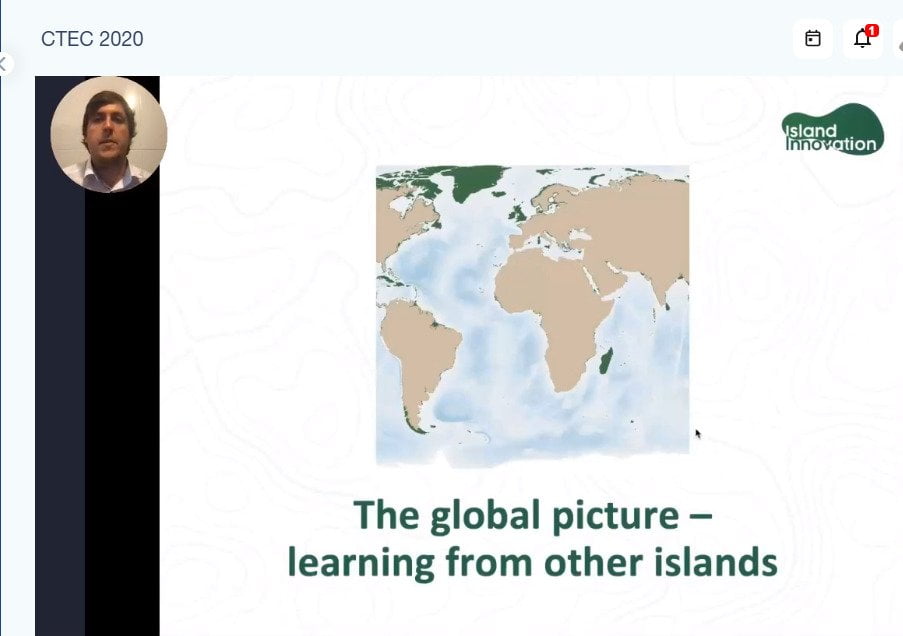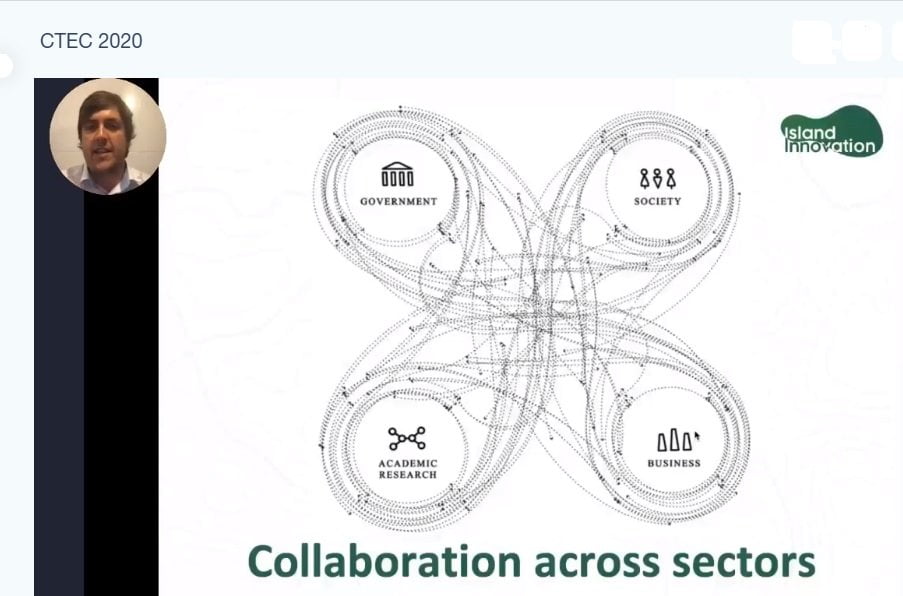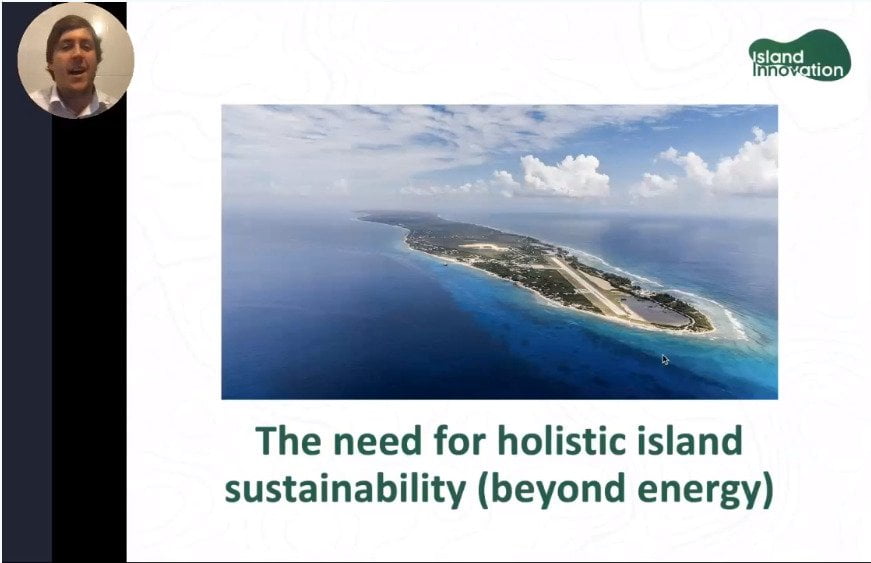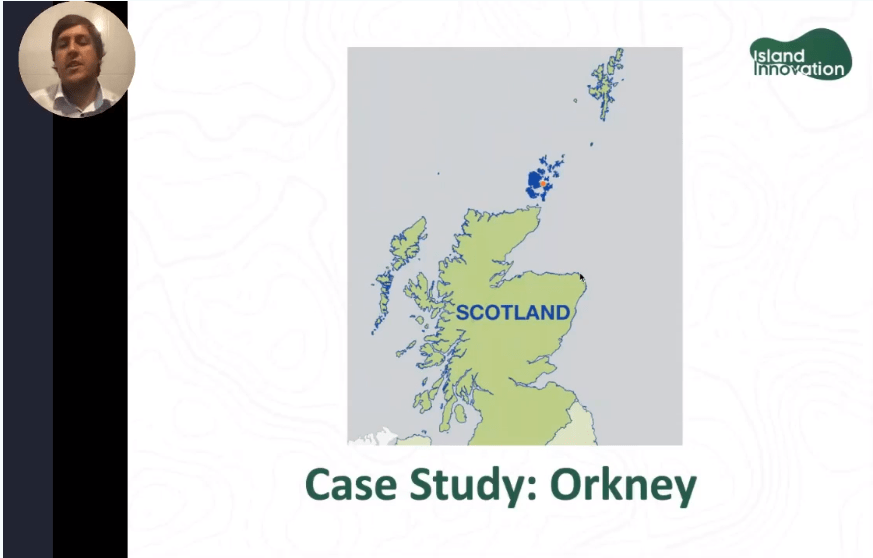The Caribbean Transitional Energy Conference (CTEC) 2020 brings the best of regional and international clean energy experience and expertise together. At this year’s event, James Ellsmoor, Director of Island Innovation, offered his knowledge in a talk on how partnerships, across industries, within communities and between countries can be used to build back cleaner and more resilient small island nations, such as the Cayman Islands in a post-COVID world.
The key opportunities highlighted in the presentation included:
- The importance of island nations around the world learning from each other, because despite differences like location, climate and culture, each individually faces many common challenges.

- It is crucial that island nations form alliances and work together. Being a U.K. overseas territory, the Cayman Islands could also examine similar relationships, such as between the Netherlands and its overseas territories.
- Collaboration across sectors, is essential, as this will lead to greater efficiency and success in building a clean and resilient Cayman. James demonstrated this using the “Quadruple Helix” model which recognises four main actors in the innovation system: Government, Society, Academic Research and Business. All four sectors are interlinked and must collaborate collectively in order to efficiently bring about fundamental change within the Cayman Islands. This includes the need for public-private partnerships.

- It is important to realise that The United Nations Sustainable Development Goals are not as simple as just implementing the use of renewable energy technology, as some may assume. The 17 SDG categories are interlinked and cannot be separated, meaning it is vital not to just focus on increasing renewable energy usage and instead a holistic approach is necessary to achieve truly sustainable long-term development.

- The Cayman Islands could emulate islands around the world that have successfully adopted the use of renewable energy such as Orkney’s groundbreaking reFLEX scheme which utilises solar, wind, waves and tidal energy that is stored in batteries which then powers a smart grid using renewable energy for homes and electric vehicles. In order for technology such as solar panels and electric vehicles to become widely used by the people of Orkney, there has been an island-wide educational program put in place to involve the local population over the last 20 years.

- While Orkney and the Cayman Islands are different in many ways, they both have important tourist industries. While tourists are unlikely to visit a destination merely because technology such as solar panels are used there, they will increasingly choose sustainable destinations powered by renewable energy. Sustainability needs to be central to “Brand Cayman”.
- Dart, the sponsor of this session, is located in the Cayman Islands and is involved in multiple industries, with one common purpose: “to stimulate sustainable economic growth and enhance the quality of life in the Cayman Islands.” Recently Dart began mapping their activities to the United Nations’ 17 Sustainable Development Goals. The company is one of the largest local producers of solar energy, and they believe in embracing emerging technologies to decrease dependence on fossil fuels and reduce carbon emissions. They were an early adopter of recycling in the Cayman Islands and invested in an Andela glass pulveriser in 2012. For the past eight years, this has processed all glass and ceramics collected through the government and other recycling depots. Dart has been supporting local education programmes for more than a decade, as access to inclusive and equitable quality education is vital to the sustainable development of the Cayman Islands.
The Cayman Islands Government has four goals related to renewable energy:
- “Ensure an environment where the people of the Cayman Islands are knowledgeable about sustainable energy and sufficiently educated to make informed choices about energy options in their daily lives.”
- “Position the Cayman Islands as a destination of excellence and the standard for the development and application of sustainable energy solutions in small-island developing states.”
- “The Cayman Islands will have a modern energy infrastructure ensuring that energy supplies are produced and distributed competitively, safely, reliably, efficiently and affordably supported by a governance framework of effective and responsive regulation, fuel security, environmental sensitivity and sustainable development.”
- “Provide the framework where these opportunities are not only identified, but systematic, deliberate and sustainable actions are taken to leverage them into the socio-economic fabric of the islands while respecting the constraints and carrying capacity of the natural environment.”
The session was moderated by Daphne Ewing Chow, a Senior Environmental Journalist and Senior Contributor at Forbes from Barbados who now lives in the Cayman Islands. During this discussion, a number of questions were posed by Daphne such as “How would alliances be made with other islands in the Caribbean?”
At the end of the session, Daphne added that James has been able to bring a global perspective from many different islands that might seem different to Cayman, but are facing similar challenges. The session highlighted the need for the involvement of all sectors of society in a successful transition to renewables and the need to look at all of the SDGs which are so fundamentally interconnected.
We would also like to offer a big thank you to dart for sponsoring this session and the Cayman Islands Government and Cayman Renewable Energy Association for organising CTEC 2020.



